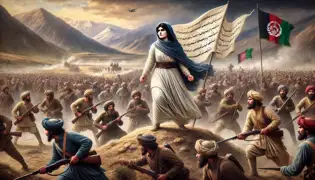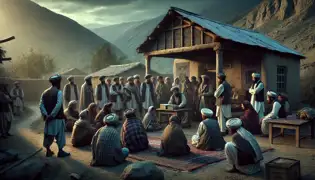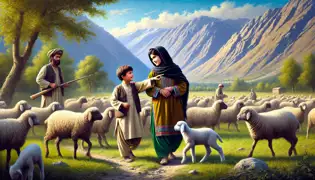The Legend of Malalai the Brave
Reading Time: 7 min

About Story: The Legend of Malalai the Brave is a Legend from afghanistan set in the 19th Century. This Dramatic tale explores themes of Perseverance and is suitable for All Ages. It offers Historical insights. The inspiring tale of a shepherd’s daughter who became Afghanistan’s symbol of courage and resistance.
The land of Afghanistan is one of paradoxes: harsh yet beautiful, ancient yet unyielding in its vitality. Its mountains have stood as sentinels for millennia, sheltering the stories of those who dared to dream beyond their circumstances. One such story is that of Malalai, a woman whose courage became the heartbeat of a nation. Her name is not just a name—it is a call to arms, a whisper of hope carried on the wind.
This is the legend of Malalai of Maiwand, a girl born into a humble shepherd's family, who rose to become the symbol of resistance during one of Afghanistan’s most decisive battles. Her journey, as you’ll see, is not just about war but about the strength of the human spirit, of unity, and of unwavering resolve. Afghanistan in the 19th century was a land shaped by its unforgiving geography. Rugged mountains carved the horizon, valleys stretched in golden hues, and life unfolded as a delicate balance between tradition and survival. For the villagers of Maiwand, the days were ruled by the rhythms of nature—harvesting, herding, and preparing for the long winters. Malalai, the eldest daughter of a shepherd named Gul Mohamad, grew up in this quiet village. Life was not easy, but it was predictable. Her mornings were spent helping her mother spin wool and bake bread, while her afternoons were spent in the open fields with her brothers, herding their sheep and weaving stories from the clouds above. It was her father who shaped her sense of duty. Gul Mohamad, though uneducated by formal standards, was a storyteller with a sharp mind. Around the evening fire, he spoke of the bravery of their forefathers, of fierce warriors and proud women who defended the land against invaders. “Remember, Malalai,” he would often say, his voice steady and deliberate, “there is no greater honor than to live and die for what you love.” The words rooted themselves deep within her. Even as a child, she showed a resilience and curiosity that set her apart. She asked questions about the world outside Maiwand, about the soldiers that passed through their village, about the poems sung by elders at weddings and funerals. She was, in every sense, a child of her land—sharp like the mountain air and bold like the winter winds. By the time Malalai reached her late teens, war was no longer a distant tale. The British Empire, embroiled in its “Great Game” with Russia, had turned its eyes to Afghanistan. They sought to control it as a buffer state, unaware that this rugged land was as unconquerable as the Afghan spirit itself. In 1878, the Second Anglo-Afghan War began, and it wasn’t long before the conflict reached Maiwand. British forces sought to subdue the Pashtun tribes who had resisted their expansion, while local warriors, many armed with little more than old muskets, fought with unyielding determination. For Malalai’s family, war was both a distant storm and an ever-present shadow. Her father and brothers often left to join the tribal forces, leaving the women to tend to the homes and fields. The nights grew quieter, the stars seemed dimmer, and the air carried a tension that no one dared speak of aloud. It was during this time that Malalai’s role began to shift. She was no longer just a shepherd’s daughter. She became a source of comfort for her neighbors, a voice of calm for her mother, and, eventually, a beacon of hope for her people. In the summer of 1880, the people of Maiwand received grave news: British forces were advancing toward their region. Tribal elders convened urgent meetings, and the call to arms spread like wildfire. Farmers laid down their plows, blacksmiths abandoned their forges, and young boys who had barely held a rifle stood shoulder to shoulder with seasoned warriors. Malalai watched as her father and brothers prepared for battle, their faces stern but their resolve clear. She wanted desperately to join them, but tradition and duty held her back. Yet, as the men prepared to leave, she approached her father with a determination he had never seen before. “Baba,” she said, gripping the edge of his tunic, “if I cannot fight with you, at least let me inspire those who do. Our men will need more than swords and bullets—they will need their spirits to stay strong.” Gul Mohamad paused, his eyes softening. “My daughter, your heart is brave, but war is a harsh place. Do you truly understand the risks?” “I understand that if we do nothing, our land will be lost. Let me go—not as a fighter, but as a voice to remind them what they’re fighting for.” And so, Malalai joined the warriors of Maiwand. She carried no rifle, no blade. Her weapon was her voice, her presence, and her unwavering belief in her people. July 27, 1880. The sun rose over the plains of Maiwand, casting its golden light over a makeshift army of Afghan tribesmen. The British forces, well-armed and disciplined, stood in stark contrast to the ragtag group of farmers and shepherds they faced. Yet, the Afghans held an advantage—their sheer will to defend their land. Malalai stood among the warriors, her black veil draped over her shoulders and a white banner in her hands. She had spent the previous night stitching lines of poetry onto the cloth, verses that spoke of honor and sacrifice. As the battle began, she moved through the ranks, her voice cutting through the chaos like a clarion call. “Do not falter, my brothers! This is our land, our blood. Fight not for yourselves, but for the generations yet to come!” The clash of swords and the roar of gunfire echoed across the plains. Despite their courage, the Afghan forces began to waver. The British, with their artillery and disciplined ranks, pushed forward relentlessly. The ground beneath Malalai trembled with each cannon blast, but her resolve remained unshaken. When a tribal leader fell, the banner he carried slipped from his hands. Without hesitation, Malalai rushed forward, seizing the flag and raising it high. Standing atop a small hill, she called out to the warriors. “Do not retreat!” she cried, her voice filled with both fury and hope. “I would rather die on this soil than live as a coward. Forward, for Afghanistan!” Her words ignited a fire within the men. With a roar, they charged once more, their spirits renewed. The tide of the battle began to turn, but Malalai’s bravery came at a cost. As she waved the flag, a British bullet found its mark. She fell, her body crumpling to the ground, but her spirit seemed to linger, urging her people onward. The death of Malalai did not break the Afghan warriors—it emboldened them. With a ferocity born of grief and determination, they overwhelmed the British forces. The Battle of Maiwand ended in victory for the Afghans, a testament to their unity and resolve. Malalai’s body was carried back to her village, where the women wept and the men stood in solemn silence. Her father, though heartbroken, spoke with pride. “She may have fallen, but her voice will never be silenced. She is the light of Maiwand.” To this day, Malalai is celebrated as one of Afghanistan’s greatest heroines. Her story is told in schools, her name is invoked in songs, and her sacrifice is honored in monuments and poetry. She is a symbol not just of courage, but of the unbreakable spirit of the Afghan people. In the quiet corners of Maiwand, the elders still gather to recount her tale to the young. They speak of her bravery, her determination, and her unyielding love for her homeland. And as the stars shine over the mountains, it is said that her spirit watches over the land, a guardian of its people. Her story reminds us that true courage is not the absence of fear, but the strength to act despite it. Malalai of Maiwand may have lived in a time of war, but her legacy is one of peace—of hope that even in the darkest moments, a single voice can light the way.A Childhood in the Shadows of Mountains
The First Whispers of War
The Call to Action

The Battlefield of Maiwand

Victory and Sacrifice

Epilogue: A Legacy Etched in Stone


















